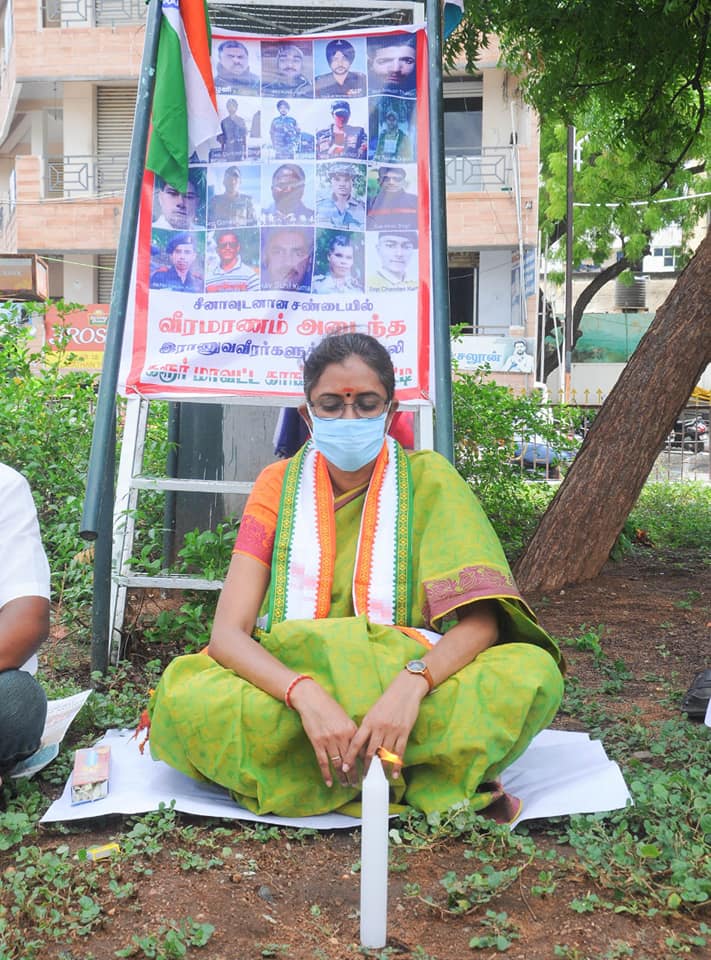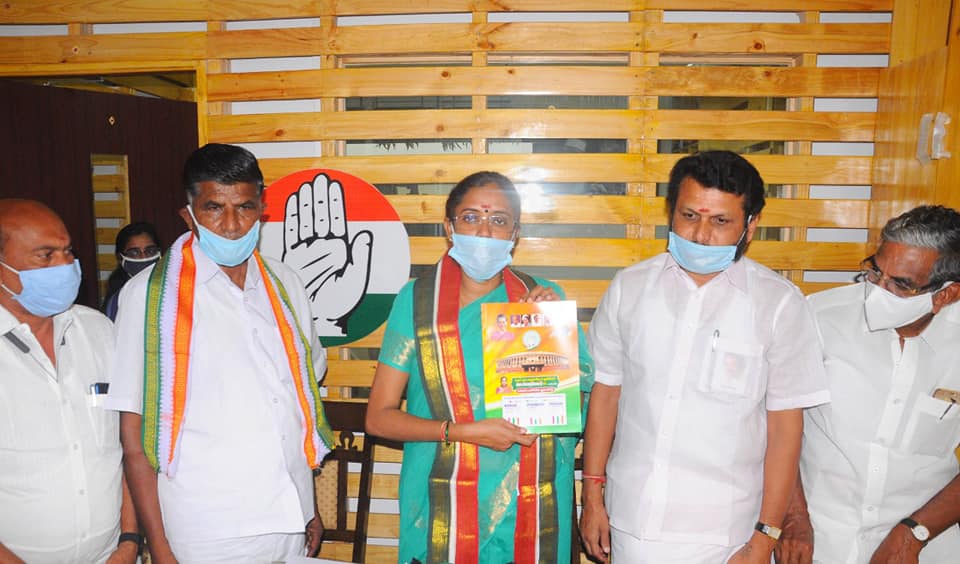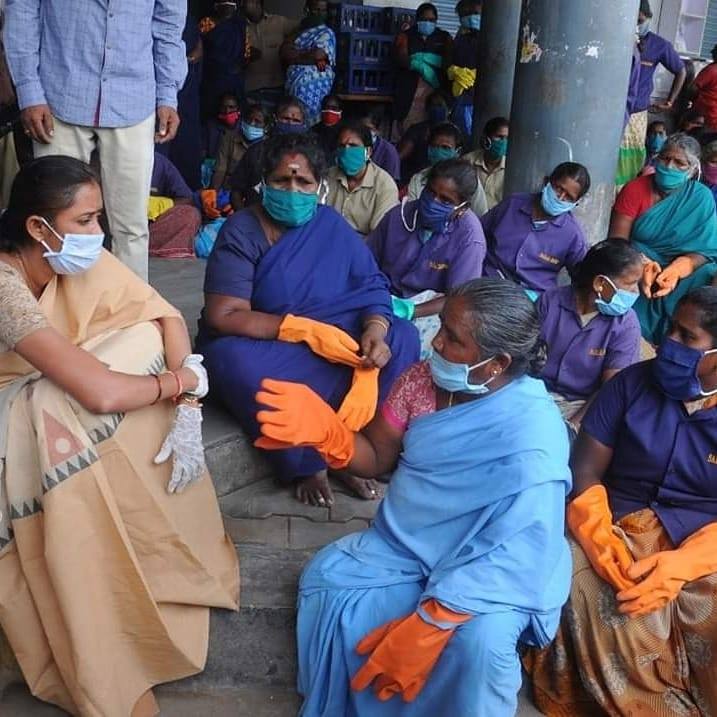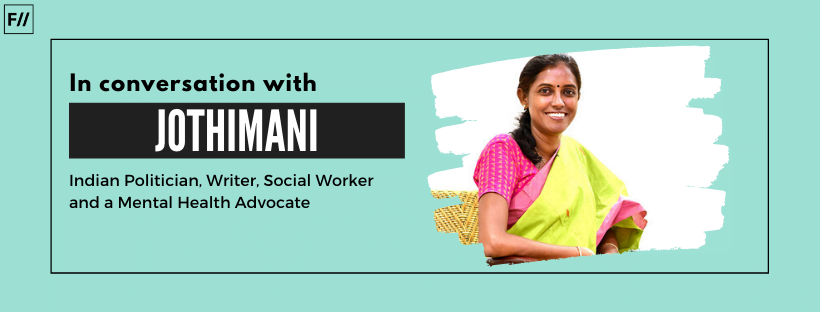Editor’s Note: FII is excited to announce its collaboration with independent journalist Poorvi Gupta who will, through multiple interviews, give us an insight into the lives of Indian women MPs and their journey in politics, particularly during the #pandemic.
A politician who has always had the attitude of an activist fighting against injustice, 44-year-old Jothimani Sennimalai, the Lok Sabha MP from Karur, won from the constituency against AIADMK’s veteran politician Thambidurai. From getting into politics because a Dalit community in her village was discriminated against from getting water supply to now being a vocal ally of the transgender community apart from working towards real issues faced by her constituencies, Jothimani has proved her political soundness time and again. What sets her apart from the other parliamentarians is her ability to address mental health as an issue that MPs face too.

In this freewheeling interview with Poorvi Gupta, she delves into various aspects of her work and how coronavirus has impacted it all.
Q: You started your journey in politics when you were just 21 years of age. How did your foray into politics happen?
Jothimani: I come from an agricultural background where none of us were interested in politics. Like any other middle-class family, we also looked at politics as a bad place. But even at home there used to be political discussions as my grandfather was a Gandhian and my father believed in the Dravidian movement. But fighting an election was unheard of in my house.
There was a huge water issue in my village of Aravakurichi in Karur district of Tamil Nadu wherein while my community had enough drinking water facility, people had banned the Dalit community from taking water from the general water pipeline. I felt that was an injustice done to the Dalit community and despite the fact that I didn’t know any politics at all, I filed my application to contest the Panchayat level election. In those days in 1996-97, when I was studying in college, the Panchayat Raj Institutions had started to reserve 33% seats for women.
I realize now that my politics has always been about acting against injustice. Nothing more, nothing less. At that time I thought, if I have power, I can resolve any issue but later I realized that that’s not the truth. When I decided to fight the election, the sky literally fell on my house. My mother and all other relatives were very upset with my decision. For the next month, lots of advising ceremonies happened at my house but I was determined and my mother also relented. She said that now that I was an adult, I have the right to choose for my life. However, she did not agree with my decision.
We also had a transportation issue in my village so when I was in college, my cousin used to pick and drop me from college in the neighbouring town. So my mother firmly told me that I have taken a decision that no one in the family or the village agrees to, it’s my own call and I will have to face its consequences alone. From people’s perspective, they were fed up with the regular politicians. My family also had a good name as my father used to do a lot of charitable things non-politically. At that time, a lot of people voted me in because they thought that I was such a young girl and I should not be disappointed (laughs). Additionally, the Dalit community voted for change when they voted for me and that’s how I won my first election.

Q: Several media reports say that Congress leader Rahul Gandhi handpicked you. How do you think he has impacted your political career?
Jothimani: After losing the assembly election from Karur, in 2014, the Congress party again gave me the opportunity to fight against a senior politician, M. Thambidurai, who was a five-time MP and the Deputy Speaker of Lok Sabha. Mr. Rahul Gandhi thought that I could win over him. He is a mentor to me. From him I learnt to be quiet, I learnt to understand things and to be very committed to my work in the field. He has made me what I am today after my mother. It was my mother who built my character, my values, my support system, my strength. After her, he taught me the larger picture of politics and that it is about working with people and their issues irrespective of whether we are in power or not. He is not the kind of leader who will force their subordinates to do things. Instead, he will have conversations with several people like me who have very strong views and have a strong-headed mindset.
From getting into politics because a Dalit community in her village was discriminated against from getting water supply to now being a vocal ally of the transgender community apart from working towards real issues faced by her constituencies, Jothimani has proved her political soundness time and again. What sets her apart from the other parliamentarians is her ability to address mental health as an issue that MPs face too.
Q: How was your first year as an MP and what are some of your key learnings as a first-time MP?
Jothimani: It was a really exciting year. Since the time I got the ticket, fighting the election to my huge victory, I never really attached it to myself. I see this as an opportunity given to someone from within the masses. The huge mandate that I got, sent a message that someone like me who does not have a political background and believes in honest politics, could also win. Being a first-time MP comes with a lot of responsibility so I am putting in my 100% effort at working hard. Since my parliamentary constituency is huge, as it comes under four different districts, I have to travel extensively to meet people and understand their issues. Of all the 6,800 villages, we have managed to visit 4,800 villages and it has given me a lot of awareness.
Tamil Nadu is considered to be a highly developed state and it is partially true. We also have a very strong foundation of politics and government. But when I visited the villages I found out that despite the fact that we have several schools, the senior secondary schools have a looming issue of insufficient and improper toilets for girls. Secondly, we have a lot of educated youth with post-graduate and doctorate degrees but no jobs. They don’t even know where to apply. I found out about these things by travelling across villages and interacting with people on the ground.
Thirdly, my performance in parliament is extremely important to me because one thing that really distresses me is that people like me who are elected to the lower house are elected to see this kind of parliament. It doesn’t believe in debate and listening to the opposition and people’s rights. Except for a handful of legislative Bills, rest all the laws are brought in to undermine the rights of each and every citizen of India. Parliament doesn’t strengthen democracy. it doesn’t empower the last man and the Panchayat Raj system. Sometimes in the parliament, I feel like it is only working towards empowering the BJP party but then I convince myself that it is because of this reason people like me are brought into power to fight this case out. So I am fighting vehemently in the parliament despite being physically and mentally thrashed by it. I am very vocal and aggressive in the parliamentary proceedings and ask several questions on various Bills.

Q: How is your constituency tackling the pandemic?
Jothimani: Somehow COVID-19 hasn’t affected my district much but the lockdown has seriously devastated people’s businesses. Even before the lockdown, people were sorely impacted due to demonetization and GST, but the virus and the lockdown deteriorated the business further.
For the people of my constituency initially, we started community kitchen service so everyone gets food to eat but later on, we realized that food alone will not help the public. We have been distributing groceries and ration to everyone who is reaching out to us including people who were self-employed but can’t afford basic necessities because of the shutdown, like barbers, drivers and other vulnerable communities like transgender people, differently-abled people, single women etc.
Also read: These Women MPs Made History By Getting Elected In 2019
I don’t just support the LGBTQ community but everybody’s right to choose their sexual preferences, food, marriage, education etc. We cannot be barbaric and snatch people’s fundamental rights. I firmly believe that just like anybody else, the LGBTQ community also has the right to choose and we cannot undermine it.
Q: How does a typical day look like in your life in the times of coronavirus in life?
Jothimani: Generally, I worked for 18-20 hours even before the pandemic so for me physically it was not devastating. However, mentally this has had a huge impact to see this kind of situation unfold. Right now wherever you see, a lot of people are going through miserable times so it is mentally pressurizing for me to work in the field. We are trying as much as possible to support the people despite the fact that I have gone through trauma along with people because every other day we are meeting thousands of people. I have been visiting 20-25 villages a day so we see a large chunk of people left without anything because the government literally washed their hands off of them. When we see such a situation, we actually lose the fear of coronavirus because there is so much political apathy.
Q: You have always been very vocal about your support to the trans community. Tell us about it.
Jothimani: I don’t just support the LGBTQ community but everybody’s right to choose their sexual preferences, food, marriage, education etc. We cannot be barbaric and snatch people’s fundamental rights. I firmly believe that just like anybody else, the LGBTQ community also has the right to choose and we cannot undermine it.
Q: During the lockdown and the spread of coronavirus, the LGBTQ community is also one of the most vulnerable communities, what are you doing to support them?
Jothimani: I totally agree with you, but in my constituency, the LGTBQ community hasn’t reached out for support yet. We did provide basic needs to the transgender community but other members of LGBTQ haven’t yet called out to me.
Q: Have you taken any initiatives to reach out to them or understand why the community hasn’t voiced their concerns at such times?
Jothimani: I will try. So far we haven’t tried anything on that front because we already are bombarded with support requests but definitely I will look into it.

Q: There has been a rise in domestic violence against women across the world, have you seen a spurt of such cases in your constituency and how are you dealing with the rise?
Jothimani: I have seen many videos on this issue and even Mahila Congress ran a campaign but frankly, I haven’t received any such complaints in my constituency yet. Maybe Tamil Nadu is a better state in this concern or maybe people aren’t coming forward to report these cases because they are dealing with larger issues. One of the reasons why these cases didn’t come up as much here could be because of the closure of liquor shops in the state. Many families I know used to say that because liquor shops are shut, husbands didn’t go for drinking and hence have a happy life.
I even campaigned for alcohol shops to continue closure and 30 lakh people responded to my telephone campaign. Of these 27 lakh, people voted that the government should not open liquor shops. However, despite people’s appeal, the government opened the alcohol shops and even increased the opening duration. My opinion is that alcohol shops being shut could be one of the reasons we didn’t see so much of a spurt in domestic violence cases.
Q: But could it also be possible that women aren’t reporting cases because they are having to live with their perpetrators 24×7?
Jothimani: I agree with you. There could be various reasons for non-reporting of such cases—maybe women aren’t aware of how to report or they don’t know that police are actively registering such cases etc. There can be several reasons but I haven’t personally received any calls for help in this case.
Q: Do you think the ongoing political discourse of communalism has made an impact in your constituency?
Jothimani: In my constituency, the first set of 27 COVID-19 patients were undoubtedly from the Jamaat, then Tamil Nadu reported several other cases of Tablighi jamaat members affected by the coronavirus. During this time, the central government and the TN state government very cleverly communalised the whole situation despite the disease having no communal, caste or gender bias. It can affect anyone and we have to stand united to curtail its transmission. Still, the government tried to shamelessly politicise and communalise the issue and there was some impact of it in the beginning. I was very worried about it but thankfully, people quickly realized that communal hatred is not the solution and Tamil Nadu citizens came out of it. Later on, Jamatis also started to donate their plasma which sent out a very strong message.
Q: While I have spoken to quite a few MPs for this series, you are the only one who has openly spoken about the mental health impact of coronavirus. How important do you think it is to address it?
Jothimani: See we are very strong people if we open up about our vulnerabilities; it does not mean we are weak. There are so many instances including a very recent one when I expressed my anguish and the ruling party leaders abused me. I don’t understand how is it possible as a woman who is sensible of people’s needs to not be traumatized? There are many nights I haven’t even been able to sleep well.
Q: Politics being a highly male-dominated area of work. Do you think it is also a misogynistic workplace?
Jothimani: I agree that politics is a male domain, unfortunately, but in the parliament during debates, I don’t feel that women are treated any differently. However, in politics, people’s approach is discriminatory on the basis of gender. People tend to believe women can’t hold up in a debate or can’t speak on issues other than gender-related issues etc. They think that women can’t speak on tough matters like finance and defence issues. These things irritate me and I am really vocal about it.

Q: What are some of the goals you want to achieve specific to your constituency by the next three years of your leadership?
Jothimani: During my campaign, we made five major promises:
- Skill development and employment
- Water conservation
- Women support centres
- Addressing the policy issues of MSMEs
- Value-adding in agriculture.
We are working on skill-development wherein I have formed a team which is collecting data and it will take a few more months before the initiative is set in motion. One thing that I worry about is that the MPLADS (Member of Parliament Local Area Development Scheme) fund is over now and I depend largely on it for the water conservation program. I hope to work on building toilets in all the schools in my constituency and it is one of my goals.
I am confident that I will be able to fulfill these.
Q: If you could go back in time and change your journey and not choose politics at such a tender age, would you do it?
Jothimani: I might have done it six years ago but not anymore because the country is torn into pieces, the politics of hate is looming large on our heads. We are under immense threat but six years ago I would have happily gone back and lived an innocent life but now I feel that innocent girls should come into the political fray and take a strong stand.
Also read: Here Are 8 Young Women MPs Who Made News In 2019
We, who are on the field for the past 60-70 days now have seen so much apathy and realize that this is not the India which we want to build and dream of. There might be poverty and lack of resources but people should never feel that the government of the country let them down. This is an altogether different India but in sometime the Congress Party will fight back and take India out of the clutches. At that time, I would really love to take a break and do other things that I enjoy like writing, travelling and working with children and farming.
(Jothimani was a former writer and wrote the award-winning short story collection Ottrai Vasanai. Apart from this, she has also written a biographical book about her political experiences called Neer Pirakkum Mun and a novel named Sithirak Koodu. She writes under the pseudonym of Indira.)
Featured Image Source: The Week
About the author(s)
Poorvi Gupta is an independent journalist who has been covering gender through the intersections of caste, class, colour, age, community etc. Her work revolves around various issues that expose gender inequality and human rights violations in Indian society. In her free time, she calls out manels and casual sexism on social media and in her house too.





A very good inspiring read.